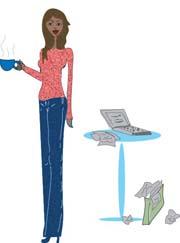 Having friends at work and getting along with the people in my office is important; no argument there. Nothing’s better than coming in after a great weekend and having someone to share our stories. And since we all know we spend far more time at the office than with our families — let alone our friends — it makes getting along with your cubical-mates all the more important.
Having friends at work and getting along with the people in my office is important; no argument there. Nothing’s better than coming in after a great weekend and having someone to share our stories. And since we all know we spend far more time at the office than with our families — let alone our friends — it makes getting along with your cubical-mates all the more important.
But is the meaningless chitchat damaging your career? It’s shocking but true, being buddies can cause some serious trouble if you’re not careful.
How do you know if you’re too nice? Answer the following questions:
- Do you get stuck in 30-minute conversations about your coworkers’ new baby and how long it takes him or her to eat dinner each night?
- When no one wants to take the lead a project do you always offer so no one else has to take it?
- Would you rather take over your coworkers project instead of listen to them complain about it?
If you answered yes to one or more of these questions, these guidelines are integral to your future success. But first, let’s address a major question many women have — why is being nice a bad idea?
While it’s hard to believe, the truth is that even when you’re remaining professional, allowing coworkers to take advantage of your nice demeanor shows your boss you aren’t actually serious about your career, you have the willing to stand up for yourself and you are in possession of the confidence required for an upper management job.
Admittedly, it’s hard to step back and get perspective on your own actions at work. So, instead, let’s envision how you’d feel if your own manager or boss was too nice to everyone at the office. Would things get done? Would the workplace run efficiently? Here are a few aspects of your worklife that would be incredibly different if your boss was as nice as you are, then strategic actions you can take to ensure you aren’t the office doormat:
Being Too Nice … Makes for Office Instability
As the boss: Bosses who can’t effectively communicate and be authoritative with their employees cannot effectively lead their teams. Respect is lost between the parties, and when important decisions need to be made, they may fall by the wayside, making employees feel insecure about the leadership within the organization and/or department.
As a co-worker: To your peers, you need to communicate with coworkers honestly. Don’t make promises you can’t keep, whether it’s about finances or deadlines, and don’t put yourself in an uncomfortable situation just because you can’t say, “no,” to your friend.
Being Too Nice … Negates Accountability
As the boss: Without an authoritative figure in the office, Internet shopping, long lunches and tardiness runs rampant. As a boss, it’s vital to the success of your company or department to handle and coach employees who take these actions.
As a co-worker: While you shouldn’t be reprimanding your own peers, associates who are sending you email forwards or engaging you in conversations you know are dragging on for too long are encouraging you to stoop to their level. Stay ahead of the game by bantering and chatting with them only when it’s appropriate (like on your breaks, at lunch or before you get started in the mornings) and cut it short when you know it’s time to get to work.
Being Too Nice … Limits Your Growth
As the boss: If you’ve ever had a performance review, you know that a good boss will give you feedback and items to work on. If they don’t, you’ll stagnate as an employee — unable to grow, develop and move up in the company. Do the same for your own employees.
As a co-worker: When interacting with coworkers, you’re not helping them by allowing them to miss deadlines, turn in projects that don’t meet your expectations or fall short of sales goals. As a peer, you can help them get to the next level to achieve their own goals. Ask why they are having trouble and if there’s anything you can do to help them, even if it’s just sharing your best practices for getting the job done. When the whole department succeeds, you, too, succeed (whether it is immediate or long-term, you succeed).
Being Too Nice … Creates Bias
As the boss: Bosses who are too friendly with their employees typically show favoritism between their associates. Intentional or not, the employees whom the superior likes get leeway not available to others.
As a co-worker: Associates who have closer relationships with one coworker than others typically “cover” more for those coworkers. It may not seem like a big deal, but a quality employer will notice these inconsistencies in your performance and may choose to hold them against you.
Having coworkers who respect you for your integrity and work ethic is even more important than those who laugh at your jokes and send you email blasts – this is why you have friends outside of work. Remaining professional doesn’t mean you can’t be close to your cubical mates, but it does mean in order to get ahead in today’s business environment you need to set boundaries and stick to them. Your own success depends on it.
